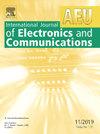Twin cascaded-trisection coupling topology and its application to dielectric waveguide resonator diplexer
IF 3
3区 计算机科学
Q2 ENGINEERING, ELECTRICAL & ELECTRONIC
Aeu-International Journal of Electronics and Communications
Pub Date : 2024-11-08
DOI:10.1016/j.aeue.2024.155573
引用次数: 0
Abstract
This article investigates the twin cascaded-trisection (TCT) coupling topology, based on which a dielectric waveguide resonator (DWR) diplexer is designed. The TCT topology is constructed by two traditional trisection structures with one coupling route being shared. By properly setting the polarities of the couplings, it can generate two transmission zeros (TZs) on one side of the passband, either the low side or the high side. In order to facilitate the TCT topology, a four-pole DWR unit is constructed by flexibly utilizing four hexagonal DWRs. A diplexer with two frequency bands of 3.4 GHz−3.5 GHz (Channel 1) and 3.6 GHz−3.7 GHz (Channel 2) is designed by using two four-pole DWR units. A printed circuit board (PCB) is employed to realize the feeding and matching network for the two units. Two TZs are generated on the high side of the Channel 1 and two TZs are generated on the low side of Channel 2, making the filtering selectivity improved. The designed diplexer is fabricated and measured. For the two measured channels, the minimum insertion losses are 0.85 dB and 0.94 dB, and the isolations are better than 44 dB and 31 dB.
双级联-三段耦合拓扑及其在介质波导谐振器双工器中的应用
本文研究了双级联三剖面(TCT)耦合拓扑结构,并在此基础上设计了介质波导谐振器(DWR)双工器。TCT 拓扑由两个传统的三段式结构构成,其中共用一条耦合路径。通过正确设置耦合的极性,它可以在通带的一侧(低频侧或高频侧)产生两个传输零点(TZ)。为了促进 TCT 拓扑结构,我们通过灵活使用四个六边形 DWR 构建了一个四极 DWR 单元。通过使用两个四极 DWR 单元,设计出具有 3.4 GHz-3.5 GHz(通道 1)和 3.6 GHz-3.7 GHz(通道 2)两个频段的双工器。采用一块印刷电路板(PCB)来实现两个单元的馈电和匹配网络。通道 1 的高频侧产生两个 TZ,通道 2 的低频侧产生两个 TZ,从而提高了滤波选择性。对所设计的双工器进行了制造和测量。两个测量通道的最小插入损耗分别为 0.85 dB 和 0.94 dB,隔离度分别优于 44 dB 和 31 dB。
本文章由计算机程序翻译,如有差异,请以英文原文为准。
求助全文
约1分钟内获得全文
求助全文
来源期刊
CiteScore
6.90
自引率
18.80%
发文量
292
审稿时长
4.9 months
期刊介绍:
AEÜ is an international scientific journal which publishes both original works and invited tutorials. The journal''s scope covers all aspects of theory and design of circuits, systems and devices for electronics, signal processing, and communication, including:
signal and system theory, digital signal processing
network theory and circuit design
information theory, communication theory and techniques, modulation, source and channel coding
switching theory and techniques, communication protocols
optical communications
microwave theory and techniques, radar, sonar
antennas, wave propagation
AEÜ publishes full papers and letters with very short turn around time but a high standard review process. Review cycles are typically finished within twelve weeks by application of modern electronic communication facilities.

 求助内容:
求助内容: 应助结果提醒方式:
应助结果提醒方式:


